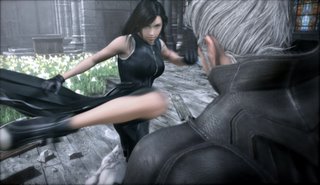Advent Children

I know that the movie has been fansubbed since last year, and I saw it back then, but this blog didn't exist then...and the American release of the movie hadn't yet occurred, so I feel this blog post is actually well timed.
Advent Children has gotten a lot of flak amidst all the mindless squealing of FF7 fans. "It's just eye candy," and "ooh, shiny," and "story ripped straight out of fanfiction.net" (good site, by the way - you have to dig for the good writers though). Some have even gone further, and regard it as "total crap." Now, obviously, I have to disagree with all this.
To set the record straight, I never beat FF7. I got through the first two discs and stopped because I hated the pacing of the dungeons (the only Final Fantasy game I ever beat was X). However, thanks to the magic of the internet, numerous fan created stories, and even more fan created sites, I learned the story backwards and forwards without even really intending to. So I knew who that person with the black spiky hair was (Zack), why everyone was wearing the red ribbons on their arms and other various parts of their body (Aeris' death), what the huge twist of Cloud's character was (Zack...again), etc.

Now, without even having beaten FF7, I fell in love with this movie. It's more related to an anime style production than live-action, which is part of the reason why I like it so much. The characters, while lacking most of the overly exagerrated facial expressions of anime, definitely draw most of their influences from anime in both design and execution. The battle scenes have anime written all over them, from the first time Yazoo vaults over Cloud on his motorcycle, to the instant Cloud first leaps above five feet into the air, and refuses to come down. Even more than all this, the story is stylistically a traditional anime.
Most people who disliked Advent Children disliked it because they felt the story was too weak. I agree that for a ninety minute movie, it definitely fell short of what I'd expect (and the Bahamut battle with the twenty second reintroduction of the entire cast didn't exactly help), but I did come away satisfied. The main reason for this is that the movie concentrates on a central theme, and pushes towards that theme at the expense of all else. Yeah, here I go again...what theme: forgiveness.
After Aeris' death, we know that Cloud never forgives him
 self. It's written all over him, during the entirety of the game (or at least the portion I played) and especially in the movie. That's what defines the movie, and director Testuya Nomura makes this clear in his interview. How do you get around to forgiving yourself; how do you stop blaming yourself for something that no one else blames you for? The movie is Cloud's journey to find the answer to those questions. The turning point occurs when he says: "I'm going to try."
self. It's written all over him, during the entirety of the game (or at least the portion I played) and especially in the movie. That's what defines the movie, and director Testuya Nomura makes this clear in his interview. How do you get around to forgiving yourself; how do you stop blaming yourself for something that no one else blames you for? The movie is Cloud's journey to find the answer to those questions. The turning point occurs when he says: "I'm going to try."That's what I loved about the movie - forget the brilliant use of CGI, the oodles of treats for squealing fanboys (like myself), and even the lackluster overall plot. When it comes down to it, Advent Children does one thing exceptionally well: answer that question. My post on NANA just a week or two ago dealt with the theme of not understanding love. Well, in Advent Children we see a perfect example of someone who goes through a journey towards understanding. The way I see Cloud's battles with Kadaj's gang isn't: "why isn't he beating the crap out of them? He should just grab sack and move on, and stop being such a wimp!" To me his physical battles are a metaphor for his internal struggle, and as he gets closer to the answer, he grows stronger.
Sephiroth says, in the final climactic battle, "what do you cherish? Give me the pleasure of taking it away," and in Cloud's mind we see images flash of Aeris, followed by Tifa, Marlene and Denzel. Tifa, Marlen and Denzel are his family (see the prequel story: Way to a Smile for more info on this), yet he refused to open up to them. Tifa says, "why do we (the connection Cloud, Tifa, Marlene and Denzel share as a family) have to lose to a memory?" By forgiving himself, Cloud overcomes his inability to connect with others, and finally takes a place within the family structure, a place he left vacant on his own accord.

0 Comments:
Post a Comment
<< Home